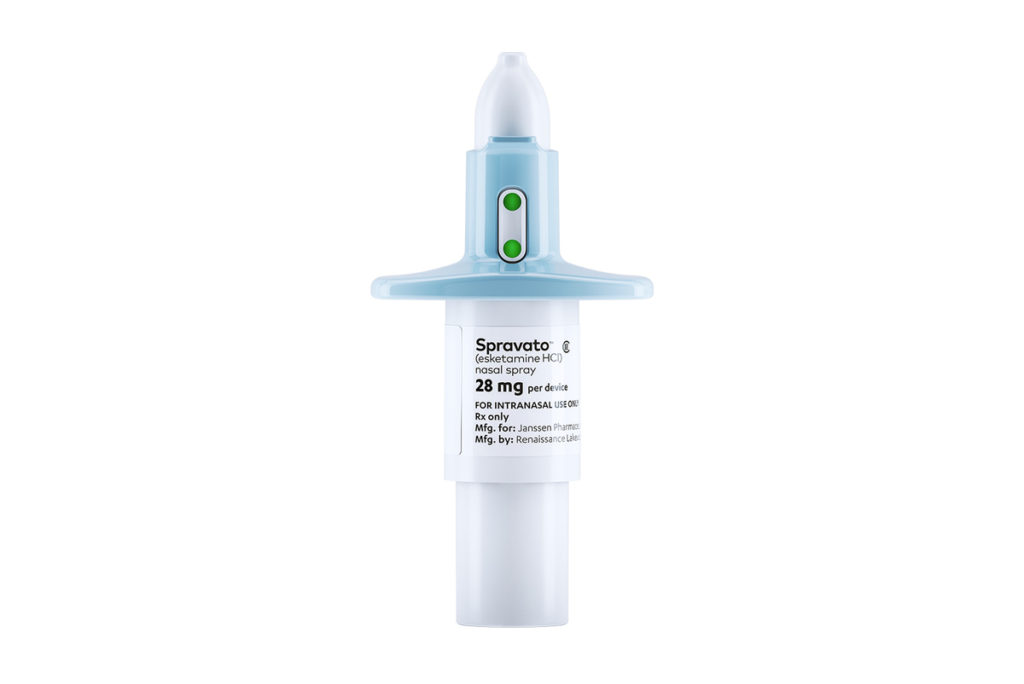
Have you tried Spravato?
Periodically, we’ve added our two cents to the discussion. Since its approval by the FDA in March of last year, we’ve seen a variety of protests from psychiatrists about its value for treating treatment resistant and severe depression. A recent article published in The Lancet provides an overview of the back and forth discussion. A group of physicians wrote a series of editorials published in The Lancet in October 2019, challenging Spravato’s value when weighed against its dangers and modest effectiveness. And the esketamine nasal spray controversy surges forward.
A significant benefit for Spravato is supposed to be that because the FDA approved it, some insurances cover the cost of the medication and the cost of the doctor’s 2-hour office visit to administer it. (Stay with us–more on this later!) That’s a substantial benefit in the eyes of some patients.
There have not yet been head-to-head controlled trials comparing racemic ketamine infusions to Spravato. But there are plenty of physicians around the country who have used both in their offices with patients. And when you compare Spravato with the effectiveness of IV ketamine treatment, Spravato’s benefit is less dramatic, and rather than occurring rapidly and robustly — it seems much milder and more gradual.

In addition, FDA approval requires the use of an antidepressant at the same time as Spravato.
(It’s like Spravato is an adjunctive treatment to an antidepressant you’re starting at the same time, or an add-on to an antidepressant that’s on board but not completely effective.) Hmm. When you think about it, it may be harder and harder to know what the FDA trials really showed.
So let’s look at the objections of these doctors, and the response from a team led by Ella Daly, M.D., associated with Janssen, the maker of Spravato.
A Former FDA Recruiter Expresses Misgivings about Spravato’s Trials
One of the critics of Spravato’s FDA approval was a former FDA reviewer himself. Erik Turner, MD, of Oregon Health and Science University in Portland, OR, made a point in his editorial.
He said that some physicians who had heard that Spravato was a “game-changer” were likely to feel disappointed when they found out that 81% of the response to this medicine was experienced by those who were given the placebo!

As a former reviewer himself, he expressed his concern that esketamine nasal spray was basically approved on only two positive trials, in spite of the failed ones.
In a short-term trial to show effectiveness, the response of reduced symptoms was not maintained for even 24 hours. It’s not hard to see why that wasn’t satisfactory.
In the FDA trials, Janssen used the Montgomery-Asberg Depression Rating Scale (MADRS) to rate change in mood in the subjects who were taking esketamine spray. Surprisingly, there was only a mean 4 point improvement on that scale which has a possible score of 60.
It’s only fair to note that 69% of subjects who were taking the active drug vs. placebo technically responded. However, when we consider that they deemed only 2 points on the MADRS as “clinically significant,” practicing psychiatrists might not see it the same way when evaluating their own patients.
Still, 52% of the placebo group scored 50% or higher improvement on their MADRS rating. So research team labeled them “responders,” (meaning the nasal spray they were testing had made them feel 50% better). But…the nasal spray that the placebo group was using was a placebo….
You can see why Dr. Turner had some misgivings about the accuracy of the conclusions.
Maintenance Trial Findings Distorted..?
Dr. Turner also challenged whether the maintenance trial’s findings were up to par because a single site in Poland was the basis for those results. Trouble was that 100% of participants in the placebo group there relapsed. Which most researchers consider a red flag.
The Janssen team defended their findings, and pointed out that the FDA didn’t see the need to eliminate data from the Polish site. In this recent response published by Dr. Daly and her colleagues, they produced another analysis which eliminated the Polish data. They used updated estimates and concluded they maintained the statistical significance.
Dr. Turner came up with his own calculation based on information openly accessible to the public. His conclusion was that there was a “non-significant difference.” So he made the appeal “in the spirit of open science” that Janssen would provide an unbiased researcher with the patient-level data to hopefully resolve this conflict and try to replicate Janssen’s findings.
Then …there is the issue that 6 people died during FDA trials. Of the six, 3 were suicides. The suicides occurred on the 4th day, the 12th day, and the 20th day after the last dose of esketamine.

There were no deaths with the placebo.
Again …troubling. And confusing for a lot of people.
Right now, the FDA says that Spravato can only be administered in offices, clinics, or hospitals registered with the Spravato Risk Evaluation and Mitigation Strategy (Spravato REMS). Patients must remain in the office for monitoring for 2 hours after each dose.
Another Editorial by Two Experts Fuels the Esketamine Nasal Spray Controversy
Ioana Cristea, Ph.D., of the University of Pavia in Italy, also published one of the editorials in October in The Lancet with Florian Naudet, M.D., Ph.D., of Universitaire de Rennes in France.
Dr. Cristea pointed out that the mild benefits of Spravato should be weighed against its potential for harm.
She also holds that since Spravato is so expensive, has high potential for abuse, and has a troublesome history for safety, the bar for FDA approval for antidepressants should be raised.
And she has a point.
In the real world, our patients suffer severe and complex disorders, and the need for robust and rapid solutions for them has been gaping for 30 years.
Mild benefits that build gradually are only effective in select patients.
At Innovative Psychiatry we do use Spravato for select patients — but we use IV ketamine much more often.
Why?
Because IV ketamine treatment can yield such rapid and robust benefits. And many patients need a treatment that’s both rapid and robust. It’s often life-saving. And we’ve published our results using IV ketamine infusions to stop suicidal thinking in real-world patients and presented our ongoing data at several conferences.
For some patients, the insurance coverage that makes Spravato more accessible to them is well worth the risk of a less robust outcome. And we’re pleased to help them access the treatment best suited to them.
With that said, since Spravato is made with the left-side enantiomer of the racemic ketamine molecule, it’s lacking the attributes of the right-side enantiomer. This is a subject that’s been side-stepped. We need more data about the right-side enantiomer.
Esketamine Nasal Spray Controversy – Was Spravato the Only Alternative to IV Ketamine?
And another thought. Janssen’s stance in developing the esketamine nasal spray was that ketamine was only available in IV form. But was that a real concern? Long before Spravato was approved, compounding pharmacies were already creating nasal sprays for ketamine, so it’s clear that a nasal spray using the full racemic ketamine molecule was a viable consideration. Some doctors have been prescribing that, and oral lozenges (called troches).

So was it really because ketamine was only available in IV form? Or was it because ketamine’s patent had expired? (Hint: The big money is in the patent.)
Is it possible that safety and effectiveness were sacrificed in lieu of monster profits?
There is no pharmaceutical company sponsoring controlled studies of racemic ketamine.
But there are real-world physicians with complicated patients around the country willing to carefully and diligently report what they see in their day-to-day offices. These are retrospective studies of their protocols, their patients, and their patients’ responses. Submitted for peer-review. And published.
We know because we’re one of them. (We’re actually the first one of them. With the largest numbers, and with extraordinary responses to treatment.)
Why do we do this?
Because we know that once insurance companies realize that IV ketamine treatment in the office can rapidly stop suicidal thoughts and plans in patients with treatment-resistant depression — even those who’ve made attempts before, been hospitalized, been failed by ECT, failed by TMS — those insurance companies are going to be pressured to stand up and listen.
If we can turn these patients around (you? someone you love? someone you know?) so that they don’t have to go to the ER, and don’t have to be psychiatrically hospitalized…. WOW! What insurance company wouldn’t jump at paying for IV ketamine infusions instead of ambulances, ERs, and hospital days??
That’s what I advocate for. Every day. Safe, effective, rapid treatment. Hope. Better lives for my patients.
Imagine that.
Imagine the goodwill gesture — such a small gesture, and such a small cost –for your insurance company to just simply approve payment for the codes we use everyday for office-based IV ketamine infusions for depression.
What a concept. Radical. Life-saving.
Read the paper. See for yourself.
IV ketamine treatment stands as the most rapid, effective treatment against severe and treatment-resistant depression, as well as suicidal thinking, that we’ve ever seen. In the office, in an evening. In less than an hour.
Which insurance company will step up and pay for IV ketamine to save a life?
A girl can dream …and that goes for psychiatrists and their patients, too.
If you believe Spravato can work for you, call us. We’re happy to provide this treatment for you. Don’t let the esketamine nasal spray controversy discourage you. In some people it works very well.

If you’ve tried Spravato and you were disappointed with the results, call us and let’s talk about what IV ketamine might do that Spravato can’t.
We’ll help you understand the differences in the fixed doses available with Spravato and compare them to what is available when ketamine is used IV.
And if you suffer from severe depression or bipolar depression, PTSD, social anxiety, alcohol use disorder, or another substance use disorder, and have been failed by other treatments, call us, too.
Because you can feel good again.
You can rebuild your life with the motivation, initiative, and energy that’s been missing with restored hope … and joy. What’s more, creativity can return and grow as you invest in your career, your relationships, and your hobbies.
We’re all about seeing you restored, fulfilled, rewarded.
Give yourself the opportunity to live well again.

To the restoration of your best self,

I have had extreme misgivings regarding Spravato for several reasons. One is the way the results of the clinical trials were reported. Another is the requirement for the patient to be on an antidepressant, which many, if not all patients will have had either a non- or negative response to. Third, the requirement that the patient be in therapy. I do believe psychotherapy to be effective and appropriate, however many patients are not able to afford this. Speaking of cost, that is my fourth concern about Spravato. The cost is absolutely prohibitive without insurance. IV ketamine is between five and ten times less expensive, and that cost is in the thousands of dollars. Five, the requirement that the patient remain in the providers office for two hours AFTER administration. IV ketamine is generally administered over 40 minutes, and even with recovery time, the actual time in the providers office is not as long. My absolute biggest concern is that Spravato comes only in two strengths, and once the dose is administered, it cannot be “taken back”. IV ketamine is given by weight, and if the patient has an adverse reaction such as marked hypertension, the IV ketamine can be paused or stopped. Once Spravato goes up the nose, it is up there, and nothing can change that. My weight falls between the doses in which Spravato is available therefore I would be over or under medicated. I am also mildly hypertensive, and have had to have a ketamine infusion stopped because of a marked raise in my blood pressure.
When people have asked my about my ketamine experiences and my feelings about Spravato, my response has always been “Just Say No!”.
One last concern, and one that may not be as important to others is the amount of waste Spravato generates. The “devices” are not in any manner recyclable (of course, materials used for IV administration are not either, however there is less waste) and medical waste is a huge issue.
After many many years of dealing with treatment resistant depression combined with severe C-PTSD nothing worked including a few courses of ECT…I started the Spravato on december 30, 2019…2x a week at the 52 mg dose…I noticed my mind calming down and the ptsd symptoms reducing…got bumped up to the 84mg 2x a week dose and I was feeling mentally fantastic. I have no memory of feeling so mentally well…My doctor of 20 years was going to keep me on that dosing schedule so i could have a chance of evening out…We were both pleased with my response to the med…at the 2x a week dosing i did notice i would get the treatment and feel fantastic all the adsociated symptoms of my combined illness gone, all the nasty PTSD symptoms gone…the suicidality, dissassociation, racing mind, confusing thoughts, and general running commentary gone…My brain felt like it was no longer firing off on a million different tangents at once and I was finally starting to actually sleep..i would have the treatment but noticed within a few days the PTSD symptoms were creeping back in…i would have the second treatment and my brain would clear…my doc, who has been my psychiatrist for 20 plus years, was so pleased…but the medical director of the community mental health agency where he works decided unilaterally, without talking to me or even knowing who I am hijacked my treatment from my trusted doc to drop me down to once a week…I had the treatment on a Wednesday and was given an appointment for the following Wednesday. By Sunday during that time all my PTSD symptoms came back with a vengence throwing me into a psychiatric crisis…My long term doc is fighting to get me back on the twice a week…I would love to see if IV Ketamine has a similiar or better effect in relieving my symptoms…but simply cant afford it..